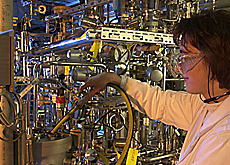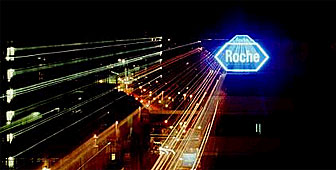Roche reports flat sales and surprise vitamins charge

The Roche pharmaceutical group has announced flat sales for the first nine months in its core pharmaceutical and diagnostics businesses.
Roche also announced that it was putting aside unexpected new provisions to cover legal liabilities from price fixing at its vitamins division.
In a statement from its Basel headquarters, Roche said that core sales were SFr19.27 billion, of which SFr13.903 billion were in the pharmaceuticals division and SFr5.367 billion in the diagnostics business.
This is just one per cent higher than the SFr19 billion figure posted for the same period last year.
Higher operating margins
However, Roche confirmed that it expected 2002 group sales to rise by mid to high single-digit rates on local currencies and repeated that it expected higher operating margins.
No profit figures were released in the interim report.
The company predicted sales at both the pharmaceuticals and diagnostics businesses would rise at double-digit rates next year, boosted by the introduction of new products including the hepatitis drug Pegasys and the HIV drug Fuzeon.
Roche announced it was setting aside a further SFr1.2 billion to cover legal liabilities at the vitamins business, which is being sold to the DSM group of the Netherlands.
“Our results for the first nine months show that our core pharmaceuticals and diagnostics businesses are right on track,” commented chairman and chief executive officer Franz Humer.
“Difficult legacy”
He described the vitamins case as a “difficult legacy” from the 1980s and 1990s, adding that the group was moving towards a settlement in outstanding lawsuits in the United States.
“The fact that we have had to record additional provisions of SFr1.2 billion is all the more unfortunate, as it casts a shadow over Roche’s major strategic and operational achievements,” Humer said.
Present and future liabilities from the vitamin case remain with Roche after the sale of the world’s largest vitamins maker, a deal which is set to close early next year.
Commenting on the figures, analyst Patrick Burgermeister at the cantonal bank of Zurich told swissinfo that they were below his expectations.
“In particular, three products disappointed me with falling sales – Xenical used in the treatment of obesity, Roaccutan for acute acne and perhaps most importantly MabThera, the medicament against cancer of the lymphatic system,” he said.
Back in the top ten
Roche, which had slipped from the top ten in the world’s drugmakers after a series of industry mergers and product setbacks, has bounced back after its acquisition of a majority stake in Japan’s Chugai pharmaceuticals company.
Analysts say that the introduction of the Pegasys and Fuzeon drugs may help take up the slack caused by imminent United States generic competition for the Accutane acne drug and for the antibiotic Rocephin by 1985.
Asked about Roche’s competitive position, Burgermeister said that this depended to a large extent on the two new drugs.
“If these products are successful I am cautiously optimistic that Roche can keep up with the competition,” he said.
Outside deals
In its quest for new drugs to add to the pipeline, Roche has struck a number of deals with outside companies in the United States, Britain and Iceland.
They include an agreement with Vernalis of Britain to research and develop anti-obesity drugs, as well as a deal with deCODE of Iceland which has produced promising leads for treating disorders including schizophrenia, obesity, osteoporosis, Alzheimer’s and heart disease.
“I think Roche is trying to repeat the success it has had with its cooperation with Genentech in 1978 in the early days of the biotechnology era,” Burgermeister said.
“It has found an interesting way of trying to avoid the increasing bureaucracy that even bigger pharmaceutical companies have, so as to let the innovating and creative biotech companies work on their own but have financial resources from a bigger partner,” he added.
by Robert Brookes with agencies
Core sales were SFr19.27 billion, of which SFr13.903 billion (pharmaceuticals division) and SFr5.367 billion (diagnostics business).
Sales are only 1% higher than SFr19 billion for the same period last year.
Roche is setting aside SFr1.2 billion to cover legal liabilities in the vitamins business.

In compliance with the JTI standards
More: SWI swissinfo.ch certified by the Journalism Trust Initiative


You can find an overview of ongoing debates with our journalists here. Please join us!
If you want to start a conversation about a topic raised in this article or want to report factual errors, email us at english@swissinfo.ch.